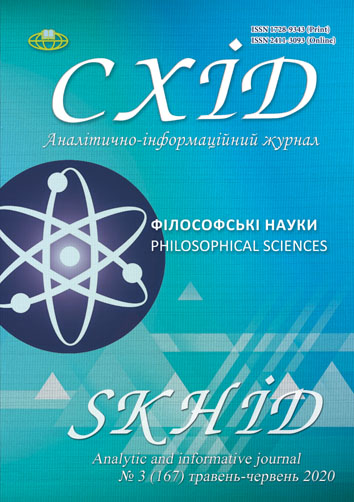Predisposition and skill dialectics in the human professional activity: philosophical comprehension
DOI:
https://doi.org/10.21847/1728-9343.2020.3(167).206673Keywords:
memory phenomenology, memory environment, predisposition, skill, choice of profession, smart approachAbstract
In our philosophical exploration we shall originally analyze dialectical contradictions of predispositions and skills as a source of memory phenomenon development; the patterns leading to the human professional activity evolution, as well as the identification of obstacles and barriers. The area of human orientation in the world of changing opportunities under the influence of the information society formation, hyper-reality and Smart Society in the cognitive innovation perspective, which is defined in the twenty-first century in the novelties of the labor market, new professions, in the processes of technological development, digitization, and transition to the virtual world of communication networks and the Internet, is justified. Moreover, studies of the memory environment reveal a search for "a certain space of inclination," as well as "corresponding features of each block" of the memory environment, determining the patterns of individual professional selection and prospects of a figure, as the subject not only of professional activity in particular, but of life in general. The correlation of the activity approach developments within the development of the subject’s life as well as the model of predisposition realization by M. Achtnich mentioned as holistic and optimal one, maintained by the specific-historical conditions of the figure, have mostly determined the key problem, which this article is devoted to. The purpose of this scientific exploration is the philosophical understanding of predisposition and skill dialectic in human professional activity (on the example of models by Martin Achtnich and Gregory Popov). The achievements of the theoretical model of Gregory Popov represent the significant results of the solution of the issue, to which P. Drucker reached himself in his formulation of "Smart Approach." It is the aforementioned concept that stands now decisive for the prospects of a "smart society" dispute in various activity spheres. Furthermore, the following disposition considers the praxeological perspective of knowledge of the patterns of the "inclination-skills" contradiction resolving application based on the models of G. Popov and P. Druker.Downloads
References
Abulhanova-Slavskaya, K. A. (1991). Strategiya zhizni. Moscow: Mysl. (In Russian)
Achtnich, M. (1979). BBT - Berufsbilder-Test. Projektives Verfahren zur Abklärung der Berufsneigung. Bern: Hans Huber. (In German)
Achtnich, M. (1971). Schicksalsanalytisch Orientierte Berufsberatung Anhand des Berufsbilder-Wahltestes. Ein Beitrag zur Psychologie der Berufswahl, des Berufswechsels und der Berufsprognose. Bericht über das 5. Kolloquium der Internat. Forschungsgemeinschaft für Schicksalspsychologie. Bern: Hans Huber. (In German)
Bell, D. (1976). The Coming of Post-Industrial Society. A Venture in Social Forecasting. N. Y.: Penguin & Co.
Borisova, G. (2007). Sotsialnaya destruktsiya kak universalnyy fenomen zhizni obshchestva (pozitsiya frankfurtskoy shkoly). Bulletin of the Nizhny Novgorod University. N. I. Lobachevsky. Series: Social Sciences. Retrieved from https://cyberleninka.ru/article/n/sotsialnaya-destruktsiya-kak- universalnyy-fenomen-zhizni-obschestva-pozitsiya-frankfurtskoy-shkoly-2 (In Russian)
Fromm, E. (2010). Po tu storonu poraboshchayushchikh nas illyuziy. Kak ya stolknulsya s Marksom i Freydom [Beyond the Chains of Illusion: My Encounter with Marx and Freud]. Moscow: AST. (In Russian)
Horkheimer, M. and Adorno, T. (1997). Dialektika Prosveshcheniya. Filosofskiye fragmenty. Moscow-St.Petersburg: Medium, Yuventa. (In Russian)
Kantor, K. M. (2009). Logicheskaya sotsiologiya Aleksandra Zinovieva kak sotsialnaya filosofiya. In: Aleksandr Aleksandrovich Zinoviev. Moscow: ROSSPEN. (In Russian)
Karmanov, A. M. (2014). Smart kak novaya stupen razvitiya postinformatsionnogo obshchestva. Ekonomika, statistika i informatika, 5: 38-41. (In Russian)
Kriticheskaya sotsiologiya Frankfurtskoy shkoly (2007). Vestnik Rossiyskogo universiteta druzhby narodov. Seriya: Sotsiologiya, 3: 52-67. Retrieved from https://cyberleninka.ru/article/n/kriticheskaya-sotsiologiya-frankfurtskoy-shkoly (In Russian)
Maksimeniuk, M. Y. & Nіkіtenko, V. O. (2016). Informatsiyno-komunikatyvne suspilstvo yak riznovyd skladnoyi sotsialnoyi systemy i vzayemodiyi. Humanitarnyy visnyk Zaporizkoyi derzhavnoyi inzhenernoyi akademiyi, 66: 266-278. (In Ukrainian)
Marcuse, G. (1994). Odnomernyy chelovek [One-dimensional person]. Moscow: Refl-book. (In Russian)
Pollock, F. (2018). Zur Geldtheorie von Karl Marx. Inauguraldissertation. Wirtschafts- und Sozialwissenschaftliche Fakultät der Universität Frankfurt am Main [Masch.] 1923. Nachdruck: Freiburg: Wien, 2018. S. 23-127. (In German)
Popov, G. S. (1951). Fenomenologiya pamyati: osnovnyye metodologicheskiye podkhody k issledovaniyu pamyati cheloveka. [Rukopis]. Manuscript. Archive „NII Pamyati“ - Arhiv NIIP (NII Pamyati) Fond 3 (Fond "Nasledie akademika G. Popova", Vena 1940). File 2, List 1. Fp.1-6. S. 41-50.
Schmidt, A. (1981). Kritische Theorie, Humanismus, Aufklärung. Philosophische Arbeiten. Stuttgart: Reclam. (In German)
Silberman, M. and Hansburg, F. (Contributor) (2000). People Smart: Developing Your Interpersonal Intelligence. Oakland, CA: Berrett-Koehler Publishers.
Soboleva, M. (2002). K kontseptsii filosofii yazyka Yurgena Khabermasa. Logos. (In Russian)
Szondi, L. (1956). Ich-Analyse. Die Grundlage zur Vereinigung der Tiefenpsychologie. Teil 1. Bern: Hans Huber. (In German)
Voronkova, V. & Kivlyuk, O. & Andryukajtene, R. (2018). Antropolohichni vymiry smart-suspilstva: teoretyko-kontseptualnyy dosvid. Humanitarian bulletin of ZGIA. 73: 25-40. Retrieved from http://www.zgia.zp.ua/gazeta/gvzdia_73_25.pdf (In Ukrainian)
Yudin, A. (1995). Paradoksy Velikogo Otkaza. In: Markuze G. Eros i tsivilizatsiya. Filosofskoye issledovaniye ucheniya Freyda. Kyiv, 275 p. (In Russian)
Downloads
Published
How to Cite
Issue
Section
License
Copyright (c) 2020 Oleg Maltsev

This work is licensed under a Creative Commons Attribution-NonCommercial-NoDerivatives 4.0 International License.
1. Authors bear responsibility for the accuracy of facts, quotations, numbers and names used.
2. Manuscripts are not sent back.
3. The publisher does not always agree with the authors' opinion.
4. The authors reserve the right to authorship of the work and pass the first publication right of this work to the journal under the terms of a Creative Commons Attribution-NonCommercial-NoDerivatives 4.0 International License. This license allows others to distribute (copy) the published work for non-commercial purposes, provided there is mandatory attribution to its authors and a link to the first publication in our journal.
5. The authors have the right to conclude separate supplement agreements that relate to non-exclusive work distribution in the form in which it has been published by the journal (for example, to upload the work to the online storage of the journal or publish it as part of a monograph), provided that the reference to the first publication of the work in this journal is included.

